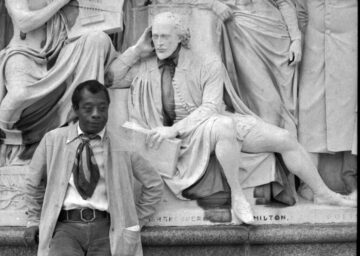Lawrence Weschler and Rich Blint at Wondercabinet:
 Weschler: It’s interesting in this context, you mentioned a second ago Giovanni’s Room, where part of the story is clearly about a deeply closeted white figure, an American in Paris, who gets involved with somebody who is clearly much more at ease with his sexuality. The relationship just curdles and he destroys both himself and his lover through his inability to be free. And he’s not only talking about gayness in that situation.
Weschler: It’s interesting in this context, you mentioned a second ago Giovanni’s Room, where part of the story is clearly about a deeply closeted white figure, an American in Paris, who gets involved with somebody who is clearly much more at ease with his sexuality. The relationship just curdles and he destroys both himself and his lover through his inability to be free. And he’s not only talking about gayness in that situation.
Blint: It’s all about American innocence. What Baldwin does in that novel that I find so compelling—and to put in a quick little plug here, a panel that Bill T. Jones and I have been working on for the festival called “After Giovanni’s Room: Baldwin and Queer Futurity,” will be held at NYLA—is precisely to this point. {For a video of the eventual panel, see here.} David, the lead character in that novel, is just part of what Baldwin calls the “ignorant armies”: these white men who take their position, life, trajectory in the world for granted, in a white patriarchal society. {It’s perhaps worth noting in this context that Giovanni’s Room came out within a few months, in 1955-56, of Graham Greene’s prescient Vietnam novel The Quiet American.—LW} It’s a story of innocence, of the refusal to be sullied by the contradictions of history, which is partly why Giovanni is there as a foil.
more here.
